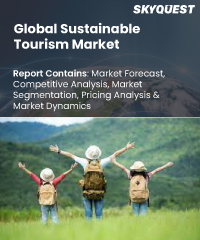
Report ID: SQMIG25O2018

Report ID:
SQMIG25O2018 |
Region:
Global |
Published Date: July, 2024
Pages:
223
|
Tables:
168 |
Figures:
72
Global Sustainable tourism market size was valued at USD 2.54 Trillion in 2022 and is poised to grow from USD 3.15 Trillion in 2023 to USD 7.74 trillion by 2031, at a CAGR of 14.94% during the forecast period (2024-2031).
The Global Sustainable tourism market Growth is mostly being driven by the availability of inexpensive flights, increased urbanization, and the growing appeal of solo travel, immersive travel, and outdoor recreational activities. Ecotourism is expanding as a result of government initiatives and the increased awareness of the negative effects of tourism on the environment, including habitat loss, soil erosion, and water pollution. Sustainable tourism travelers are also driving this expansion.
The World Tourism Organization (UNWTO) has released a historic analysis that predicts that by 2030, emissions from the tourism sector related to transportation might account for as much as 5.3% of all emissions from human activity. To support its promise to expedite the decarburization process and adopt environmental sustainability, the tourism industry must now collaborate closely with the transportation sector and government groups. The anticipated outcome of this is to propel the expansion of the worldwide market and elevate customer enthusiasm for environmentally conscious travel.
Governments and associations, however, redefined travel and tourism rules, and as a result, the industry began to perform well as a result of the governments lowering travel and tourist limits. In the upcoming years, there will likely be significant increase in the global industry due to the aging population's growing desire for nature-based travel and a paradigm shift in consumer behavior toward sustainability.
Over the last ten years, tourists, particularly younger ones, have become more and more interested in sustainable tourism. Customers are becoming more interested in sustainable travel as they become aware of the negative impacts of overtourism. Tour operators operating in various places have begun endorsing regenerative tourism as the way forward with regards to changing their vacation packages, having recognized the negative effects of unrestrained mass tourism.
Over half (55%) of all travelers worldwide have made the decision to travel sustainably and are choosing sustainable travel options in 2019, according to study data released by Booking.com. The information demonstrates how consumer perceptions of the negative effects of mass tourism have evolved over time and how the impact of climate change is now a significant factor to be taken into account when purchasing travel packages.
Government agencies like the United Nations Educational, Scientific, and Cultural Organization (UNESCO) and the World Tourism Organization (WTO) are pushing the tourism sector in an effort to draw travelers from all over the world. Nations such as the United Arab Emirates (UAE) have initiated several sustainability programs and initiatives to save the environment and position themselves as worldwide leaders in environmentally conscious travel destinations.
To promote ecotourism and regional travel, for example, the Kingdom of Saudi Arabia initiated a number of programs in March 2021. In order for tourism in the region to contribute 10% of Saudi Arabia's GDP by 2030, the nation wants to lessen its reliance on oil. Through improved transit capacity and easier access to remote tourist destinations, public-private partnerships will lead to market development and financial opportunities for the local stakeholders.
Our industry expert will work with you to provide you with customized data in a short amount of time.
REQUEST FREE CUSTOMIZATIONWant to customize this report? This report can be personalized according to your needs. Our analysts and industry experts will work directly with you to understand your requirements and provide you with customized data in a short amount of time. We offer $1000 worth of FREE customization at the time of purchase.

Report ID: SQMIG25O2018